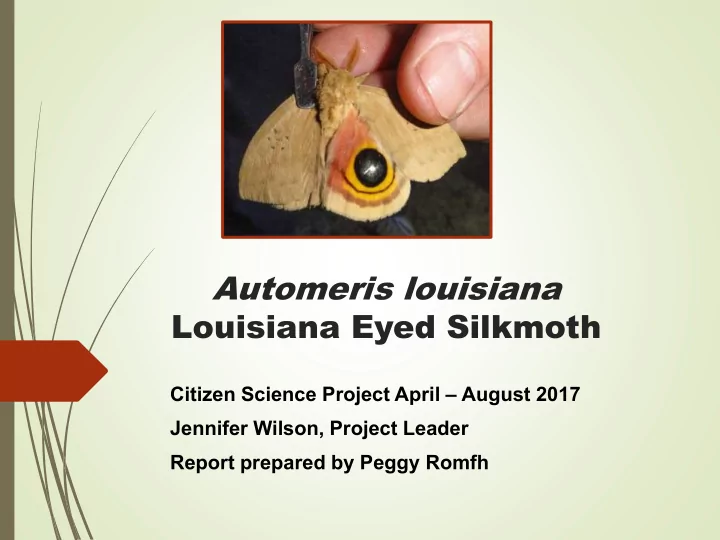

Automeris louisiana Louisiana Eyed Silkmoth Citizen Science Project April – August 2017 Jennifer Wilson, Project Leader Report prepared by Peggy Romfh
Louisiana Eyed Silkmoth (LAESM) Disco Discover ered ed in in 19 1981 81 alon along LA g LA coast co ast Similar to IO Moth but more brownish and less spotted Wing ing Span Span: : 2 1/2 - 3 1/2 inches LAESM photos courtesy of John Savell, FWS
Life Cycle YUM!! - Eggs laid on host plant. - Cocoons spun around several leaf blades of Cordgrass about 6-12 inches above the ground.
Species of Concern Sept. 2011 Limited geographic range – extreme SE Texas to extreme SW Mississippi along coast Limited habitat – coastal saltmarsh Smooth Cordgrass ( Spartina alterniflora ) Sturdy Bulrush ( Bolboschoenus robustus ) Coastal wetland loss Hurricane devastation Massive mosquito spraying BAMONA: Populations should be monitored to determine impacts of wetland loss. Unable to assign rank due to lack of available information.
Storm Stor m De Devasta vastation tion and and Wetland etland Loss Losses es Since 2000, 33 significant Wetland Losses: storms hit LA 2001 Allison Texas: 5,700 2005 Katrina acres/year 2005 Rita LA: 18,000 2008 Ike acres/year 2008 Gustav 2017 Harvey
Hypothesis (Question): Does the LAESM still exist in its historic range and has it expanded its range along the central Gulf Coast where Smooth Cordgrass (larval host) is found? Project search areas: 4 parishes in LA 4 counties in TX 2 counties in MS 1 county in AL Overall Project Leader: John Savell, LA FWS
Project – Search for LAESM in Texas Mid-Coast Refuges Mid-Coast Project Leader: Jennifer Wilson, FWS TMN-COT Citizen Scientists Oron Atkins Her Herb b My Myer ers Jo My o Myer ers Lar Larry y Peter eterson son Peggy y Romfh omfh 400 volunteer hours Pete ete Romfh omfh George Valadez
Materials: Moth Trap 5 gal. pail with suspended UV light, reflective winged frame, and funnel into bucket trap Powered by battery + solar backup Dark: UV light ON Daylight: UV light OFF
Method: Set trap at new moon. New Moons 2017 April 26 May 25 June 23 July 23 August 21 Set trap for 2 nights. Check trap in early a.m. each day Document date, habitat, species seen, life cycle stage, numbers.
Trap Locations Texas Mid-Coast BNWR Crosstrails Pond Weir Dam Road Alligator Marsh SBNWR Cowtrap Levee Sargent Unit Sargent Unit
Project Results BNWR, SBNWR, Alabama sites Texas: Jefferson County, [Chambers County (Anahuac)] Louisiana: Cameron, Terrebone, Lafourche, and Orleans Parishes
Map of Sites Seen UNSUCCESSFUL SUCCESSFUL W. MS Anahuac Map courtesy John Savell, FWS
Project Results by Date Month All Project TMN-COT Moths Traps Set Traps Set Trapped February 1 effort X March April X X X May X X X June X X X July X X X August X X X September X Hurricane X Fli ligh ght: t: Three to four broods from February to early November.
Project Conclusions Presence of A. louisiana: Cited threats (hurricanes, limited range, chemical control of insect populations, coastal land loss, and habitat fragmentation) do not appear to be limiting factors at this time. [Savell] Habitat range: No habitat expansion beyond historic range (LA and extreme SE Texas and SW MS) was observed. During this four month study at seven sites in BNWR and SBNWR, Automeris louisiana was not seen.
Project Post-notes June 8, 2018 No plans to repeat the study Center for Biological Diversity has re- petitioned FWS to remove LAESM from species of concern (along with 22 other species) to focus on about 30 other species of greater concern. Master naturalists role is critical to success. Results for Texas Mid-Coast pointed to biodiversity of species on the refuges and possibly local studies in the future of some of the non-target species seen.
Non-target Species Moth trap bucket 4/27/18 Rogers Pond Giant Water Bug Lethocerus americanus
Non-target Species: Tiger Beetles Other Citizen Science Projects: BugGuide i-Naturalist
Non-target Species: Lady Beetles Other Citizen Science Projects: Lost Ladybug i-Naturalist
Non-target Species: Doryodes sp . Moths Doryodes – DNA testing IP to ID species
Non-target Species: Other Moths Meske’s Pero Moth (Pero meskaria) – usually only found in drier areas of SW
Non-target Species: Sphinx Moths Carolina Sphinx Five-spotted Hawkmoth Manduca sexta Manduca quinquemaculata [Jennifer Wilson] [Larry Peterson]
Non-target Species: Water Boatman
Citiz Citizen Science Pr en Science Project: oject: LA Ey LA Eyed Silkmoth ed Silkmoth BugGuide USFWS Master Lost Naturalists Ladybug i-Naturalist
Recommend
More recommend